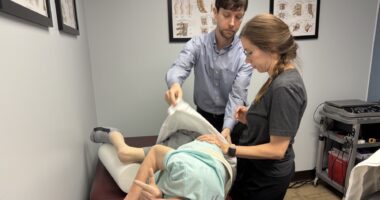Learning rare lessons with Evrysdi compassionate use program: Report

Implementing the global compassionate use program (CUP) that enabled more spinal muscular atrophy (SMA) patients to access Evrysdi (risdiplam) required close collaboration with patient advocacy groups and careful consideration of local regulations, according to a new report.
Taking such steps was key in helping the CUP to reach more patients, specifically those in lower-to-middle income nations as well as individuals with SMA whose current treatment was affected by the COVID-19 pandemic.
According to the report’s researchers, the learnings from the compassionate use program’s development can be applied to future rare disease CUPs, helping to speed their implementation by “proactively addressing key barriers.”
In turn, this can “facilitate and enhance treatment access … for patients without viable therapeutic options in countries or in circumstances in which access to innovative treatments is a great challenge,” the researchers wrote.
Key takeaways from the Evrysdi CUP development were published in a brief report titled “Global Risdiplam Compassionate Use Program for Patients With Type 1 or 2 Spinal Muscular Atrophy,” published in the journal Clinical Therapeutics. The Evrysdi CUP and support for the publication were funded by Roche, the therapy’s developer.
Compassionate use program brought Evrysdi to 59 countries
Evrysdi is an approved disease-modifying therapy for SMA that’s available in more than 100 countries worldwide. In 2019, while clinical trials were still ongoing and before any regulatory approvals had been granted, Roche launched the Evrysdi CUP.
Sometimes known as an early or managed access program, a compassionate use program aims to provide patients with serious or life-threatening conditions access to a treatment when they are not eligible for clinical trial participation and don’t have any satisfactory therapeutic options.
Touted by the researchers as the largest CUP in SMA, the Evrysdi program was providing access to more than 2,000 SMA patients across 59 countries as of July 2023.
It includes patients ages 2 months and older with SMA types 1 and 2 who have no alternative treatment options. That could be because they are not eligible for other therapies, because such medications are not effective or need to be stopped for medical reasons, or because a patient can’t participate in clinical trials.
In the report, the scientists discussed key takeaways learned from developing the Evrysdi CUP that can inform the implementation of similar programs in the future.
First, the team emphasized the importance of understanding patients’ unmet medical needs and collaborating with patient advocacy groups, dubbed PAGs. The team notes that early input from the SMA Europe advocacy group was key to designing and implementing the program — and for making it available to as many patients as possible.
Such input helped expand the program, initially intended only for type 1 patients younger than age 25, to include individuals of all ages with SMA types 1 or 2.
Moreover, these interactions led to the expansion of the program to include countries beyond where Evrysdi clinical trials were already taking place. The compassionate use program ultimately opened to all countries where regulatory filing plans for Evrysdi existed.
Differences in regulations across countries remains a challenge
Differences in laws, regulations, and medical practice across these countries led to challenges in implementing the CUP and in ensuring geographic and socioeconomic inclusivity, per the report.
The researchers noted that 39% of participating countries, covering more than 27.9% of participants, are low-to-middle income nations. Several, including Bangladesh, Bulgaria, Ghana, and Kenya, had never participated in a compassionate use program and did not have any specific regulations in place.
“With early planning and coordination, it was possible to implement the [Evrysdi] CUP in countries without prior CU [compassionate use] experience and few or no dedicated CU regulations,” the researchers wrote.
“Nonetheless, greater alignment of regulations across countries is still needed to allow more patients rapid and fair access to treatment,” the team added.
In countries where the CUP could not be legally implemented, families occasionally sought enrollment in another country. Guidelines were developed for dealing with these rare cases, but more work is still needed to best help patients in such circumstances.
“One of the remaining challenges is to achieve treatment access for patients with rare diseases who live in countries where access to innovative treatments is challenging, be it through a CUP or otherwise,” the team wrote.
quote=”center”]The present learnings contribute to the much-needed discussion between health policymakers, scholars, and health care professionals on how to address the challenges associated with the design and implementation of CUPs [compassionate use programs].[/quote]
The COVID-19 pandemic emerged just months after the Evrysdi CUP was launched. For patients using the then-already approved SMA therapy Spinraza — which must be administered in a hospital — local restrictions and lockdowns affected treatment access.
To address that, the Evrysdi CUP was expanded to include those patients, and to enable home delivery of the oral medication. Such efforts show that “CUPs can successfully respond to the needs of vulnerable patients and their health care professionals during major health care crises,” according to the authors.
Overall, “the present learnings contribute to the much-needed discussion between health policymakers, scholars, and health care professionals on how to address the challenges associated with the design and implementation of CUPs,” the researchers wrote.
“These discussions may help to establish CU best-practice guidelines that facilitate this endeavor in treating patients with life-threatening diseases such as SMA, as well as other rare diseases,” the team concluded.
The post Learning rare lessons with Evrysdi compassionate use program: Report appeared first on SMA News Today.



